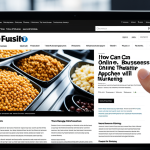Overview of the UK Business Landscape
The landscape of UK business is dynamic and multifaceted, reflecting a range of economic trends and market analysis insights. Recent assessments reveal that the current economic conditions significantly influence business operations. The UK is navigating through the fluctuating tides of inflation and varying interest rates, which are pivotal in shaping business strategies and growth trajectories. These economic shifts can both challenge and propel forward-thinking businesses.
Key industries contributing to growth include technology, finance, and healthcare. These industries are not only pivotal due to their robust contributions to GDP but also because they spearhead innovation and set trends that ripple across other sectors. Current market analysis highlights that sectors that adeptly integrate digital strategies, such as e-commerce and fintech, demonstrate noticeable resilience and expansion.
Also read : Shaping tomorrow with vallourec's new energies solutions
Recent statistics underline a gradual but steady upward trend in business development. New player entries and start-up generation have expanded the entrepreneurial landscape, although market conditions necessitate adaptable business models. Growth has been particularly notable in the service sector, bolstered by digital transformations and changes in consumer demand. These trends underscore the UK’s economic vitality, emphasizing the intertwining of technology adoption and strategic business acumen.
Technology Adoption as a Growth Driver
In the rapidly evolving landscape of UK business, technology trends play a pivotal role in shaping operational dynamics and competitive strategies. The integration of digital transformation initiatives is enhancing not only efficiency but also agility across industries. Businesses leveraging technology have not only survived but thrived amid fluctuating economic conditions by optimizing processes and cost efficiencies.
Topic to read : How Can U.K. Businesses Adapt to Rising Economic Challenges?
Impact on Operational Efficiency
Digital technologies such as cloud computing, big data analytics, and IoT are enabling firms to streamline operations and improve decision-making. For instance, real-time data analytics empower companies to anticipate market trends more accurately, leading to proactive adjustments in business models.
Case Studies in Technology Integration
A notable example is a UK-based fintech startup that successfully capitalized on innovation in business by integrating AI-driven solutions. This approach allowed them to enhance customer service and reduce operational overheads, illustrating the significance of adopting cutting-edge technologies.
Trends in Automation and AI
Currently, automation and artificial intelligence are significant drivers in reducing manual labor and improving precision in various tasks. These trends indicate a growing reliance on tech innovations to bolster productivity and maintain competitiveness in saturated markets. As automation becomes more sophisticated, UK businesses are increasingly adopting AI not only to reduce costs but also to foster creativity and innovation.
Regulatory Changes and Their Impact
The UK business landscape is continuously shaped by its regulatory environment, influencing both challenges and opportunities for enterprises. Recent legislative changes have introduced adjustments that many businesses must navigate. New business regulations focus on ensuring fair competition and promoting transparency, affecting industries ranging from finance to technology. These changes can necessitate modifications in operational processes, demanding increased diligence to ensure compliance.
However, these government policies also offer a fresh spectrum of potential innovation. By necessitating compliance with new standards, businesses have the opportunity to streamline operations and adopt inventive approaches. For instance, the requirement for enhanced data protection measures has accelerated the deployment of secure digital infrastructures, highlighting how regulations can inadvertently drive technological advancement.
Compliance challenges often emerge, particularly for small to medium-sized enterprises, which may lack the resources for seamless adaptation. Yet, by viewing compliance as a strategic advantage, businesses can leverage regulatory frameworks to differentiate themselves in the marketplace. As regulations continue to evolve, fostering innovation will be crucial in maintaining a competitive edge and seizing the opportunities that such legislative shifts present.
Shifts in Consumer Behavior
Consumer behavior in the UK has undergone significant changes, particularly in response to the COVID-19 pandemic and emerging consumer trends. These shifts have a profound impact on market demand and buying habits, influencing how businesses recalibrate their strategies. Understanding these evolving preferences is crucial for companies aiming to maintain relevance and capitalize on emerging opportunities.
Examination of Changing Preferences Post-Pandemic
The pandemic has accelerated a transformation in consumer trends, with digital platforms becoming a primary mode of interaction. Online shopping, once a convenience, is now a necessity for many, leading to a surge in e-commerce. This change demands businesses enhance their digital presence and refine their delivery systems to meet the rising expectations. Moreover, personalization in consumer experience, driven by data insights, has become a key differentiator in attracting and retaining customers.
Impact of Sustainability on Purchasing Decisions
Sustainability is increasingly influencing buying habits in the UK market. Consumers are more conscious of the environmental impact of their purchases, seeking out products and brands that align with eco-friendly values. This shift necessitates that businesses adopt sustainable practices, from sourcing materials responsibly to reducing carbon footprints, to resonate with these conscious consumers.
Insights from Market Research on Consumer Expectations
Market research highlights that post-pandemic, consumers value transparency, quality, and ethics more than ever. Insights indicate that clear communication and market demand for authentic brand narratives can build trust and loyalty. Companies that adeptly tap into these preferences stand to gain a competitive edge, emphasizing the importance of aligning business practices with consumer expectations.
Economic Conditions Influencing Growth
The economic landscape in the UK plays a pivotal role in steering business activity, with key economic indicators such as inflation and interest rates acting as crucial determinants. Current market conditions reveal fluctuating inflation rates, affecting consumer purchasing power and, consequently, market demand. High inflation can tighten profit margins for enterprises, especially within sectors sensitive to cost increases. Conversely, low interest rates may stimulate investments by reducing borrowing costs, thus fostering business expansions and enhancing growth potential.
Another growth accelerator lies in the current financial trends surrounding funding and investment. Businesses often seek external capital to drive innovation and support expansion plans. A notable trend is the rise of venture capital and crowdfunding platforms, which are increasingly viewed as viable options for securing funds. This accessibility to varied funding channels empowers especially SMEs (Small and Medium Enterprises) to diversify and innovate.
Economic policies of the government inject stability and direction into the business climate, further connecting these financial practices with real-world outcomes. Policies fostering a favourable business environment might offer tax incentives or support R&D, directly impacting business performance. Thus, staying attuned to these economic shifts enables businesses to navigate effectively through economic perturbations, bolstering their resilience and adaptability.
Innovation as a Cornerstone of Growth
Innovation plays a pivotal role in propelling UK business growth, positioning research and development (R&D) as fundamental in achieving business success. In today’s competitive climate, the entrepreneurial spirit is characterized by the constant pursuit of new ideas and solutions. R&D facilitates this by providing the necessary framework for developing breakthrough products and services that can set a business apart in the market.
Role of Research and Development
The relentless drive towards business innovation often starts with substantial investments in R&D. Companies that prioritize R&D are equipped to explore uncharted territories, transform insights into actionable strategies, and outperform competitors. For example, many firms in the technology and healthcare sectors have successfully harnessed R&D to address unique challenges, resulting in enhanced product offerings and increased market share.
Case Studies of Innovative Startups
Numerous startups in the UK are making significant strides by challenging traditional industry norms. A prominent example can be found in the fintech realm, where innovative solutions are reshaping the financial landscape. Startups leveraging developments in blockchain and machine learning are not only improving efficiency but also enhancing customer experience, redefining what consumers expect from financial services.
Fostering a Culture of Innovation
For businesses to thrive, fostering a culture that encourages innovation is essential. This involves cultivating an environment where creativity is valued and risk-taking is embraced. Encouraging employees to think outside the box and experiment with new ideas can lead to transformative changes that sustain long-term growth. Implementing structures for ongoing learning and collaboration further promotes a sustainable innovation culture.
Incorporating these aspects of innovation into business strategies not only addresses immediate market needs but also ensures preparedness for future disruptions, thereby solidifying the role of innovation as a cornerstone of business success.
Conclusion and Future Outlook
As the UK business landscape continues to evolve, several key factors emerge as pivotal in shaping its future. The integration of business predictions highlights the importance of staying attuned to future trends and market outlook. Economic conditions, technological advancements, and shifting consumer preferences collectively underscore the dynamic environment businesses operate within.
In looking ahead, there’s a growing emphasis on technology adoption and sustainability as critical pathways to remain competitive. As such, businesses are encouraged to embrace digital transformation and sustainability practices to align with emerging future trends. Furthermore, fostering a culture of innovation becomes essential, enabling organizations to continually adapt and thrive.
Navigating these changes requires strategic foresight and a proactive approach. By leveraging business predictions and anticipating market shifts, companies can position themselves to capitalize on new opportunities. Building resilience through adaptable business models will be key in navigating the market outlook, ensuring long-term sustainability and growth.






